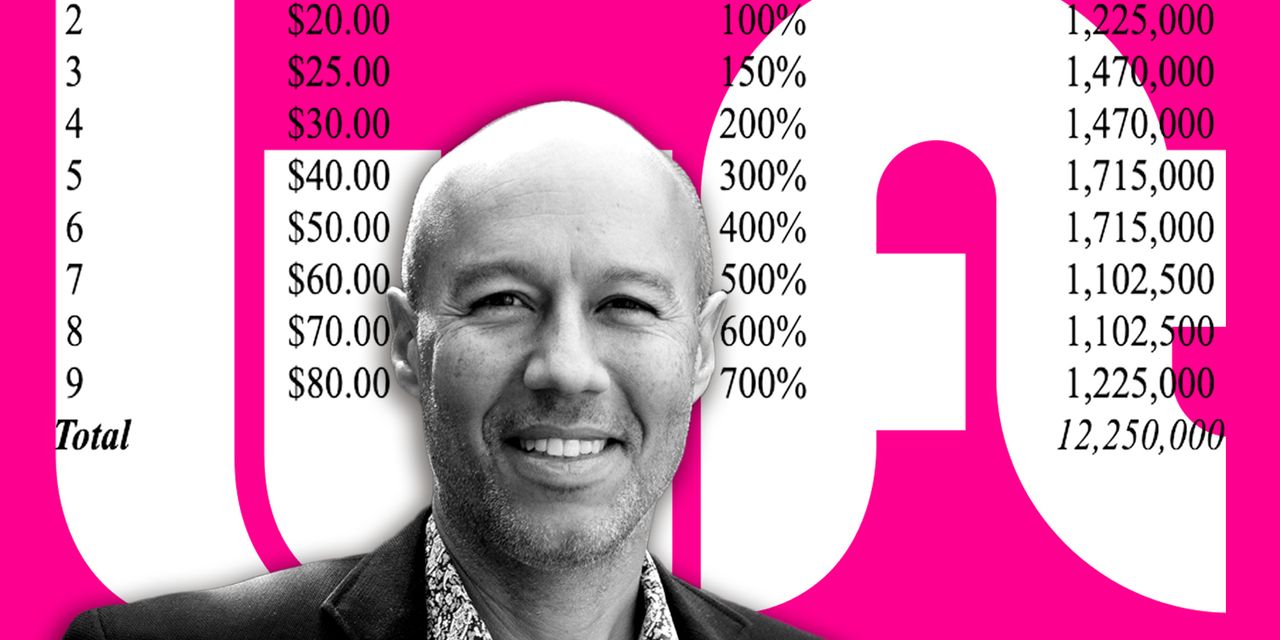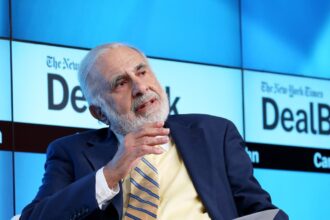Lyft Inc. is shaking up its leadership, and it’s also shaking up the way it pays its top executive.
The ride-hailing company tapped David Risher, a board member and early Amazon.com Inc.
AMZN,
employee, to serve as its next chief executive Monday, and the board is giving him a pay package with an “unusual” structure that one expert says reflects how Lyft’s
LYFT,
directors have likely “reined in their aspirations” for the company but also given him the chance for a massive payday if he can turn things around for investors in a big way.
CEO Logan Green and President John Zimmer, both co-founders who will remain as board members at Lyft after stepping down in favor of Risher, received 2021 and 2022 stock awards that would vest if the share price hit $100. Risher’s 12.25 million performance-based restricted stock units, however, are split into nine tranches that vest at different price levels ranging from $15 to $80.
Read: Lyft CEO shake-up met with a ‘why not?’ response
“Usually you would see [that type of structure] for larger companies,” Ben Silverman, the director of research at VerityData, told MarketWatch. To receive such an arrangement, an executive would need a pedigree like the one Risher has. Though he’s spent the past 13 years as a nonprofit executive, he was employee No. 37 at Amazon and served as a general manager at Microsoft Corp.
MSFT,
during the dot-com boom era of the 1990s.
Vesting tranches that begin at $15 are “a sign of the times” for Lyft, showing that those who set Risher’s pay have “lowered expectations at this point over the long term,” relative to when they gave Green and Zimmer awards that would vest at $100, according to Silverman.
Since taking a disastrous hit after Green and Zimmer’s last earnings call, Lyft shares have largely traded between $8.50 and $11. Lyft shares have failed to approach the $72 price charged in its initial public offering since its first couple of weeks as a public company, but did top $60 at times in 2021, when Green sold hundreds of thousands of shares for a large return.
Risher’s vesting tranches give him “an opportunity here for an enormous payday down the line,” Silverman said. He has a chance to rake in up to $980 million if he’s “fully successful” in helping Lyft’s stock reach the $80 mark, which would require a roughly 700% increase in the stock.
Interview: New Lyft CEO says ‘I don’t think of this as just an Uber battle. It’s a battle against staying at home.’
But even a rough doubling of the share price from current levels would “result in a meaningful payday,” he added, with 1,225,000 restricted units each pegged to the $15 and $20 price thresholds.
“The potential outcome if all the stock price hurdles are hit” would lead to “very significant wealth for Risher but also guarantees that wealth is tied to a dramatic increase in shareholder value,” Silverman continued.
“David’s compensation package is competitive in the current market and his equity grant is 100% performance based and tied to goals that are directly related to shareholder value creation,” a Lyft spokesperson told MarketWatch.
Silverman gathers that Risher already has “significant wealth” owing to his past lofty positions at Amazon and Microsoft. That existing wealth could be why Risher agreed to donate $3 million of his $3.25 million signing bonus to Worldreader, the nonprofit he co-founded.
“I told the board it’s very important to me that Worldreader become stronger instead of becoming weaker,” Risher told MarketWatch’s Levi Sumagaysay earlier this week in an interview.
In addition to the restricted stock units, Risher will receive a $725,000 annual salary and have the opportunity for a performance-based bonus.
For more: What Uber, Lyft and DoorDash’s victory on gig-worker status looks like so far
Read the full article here










